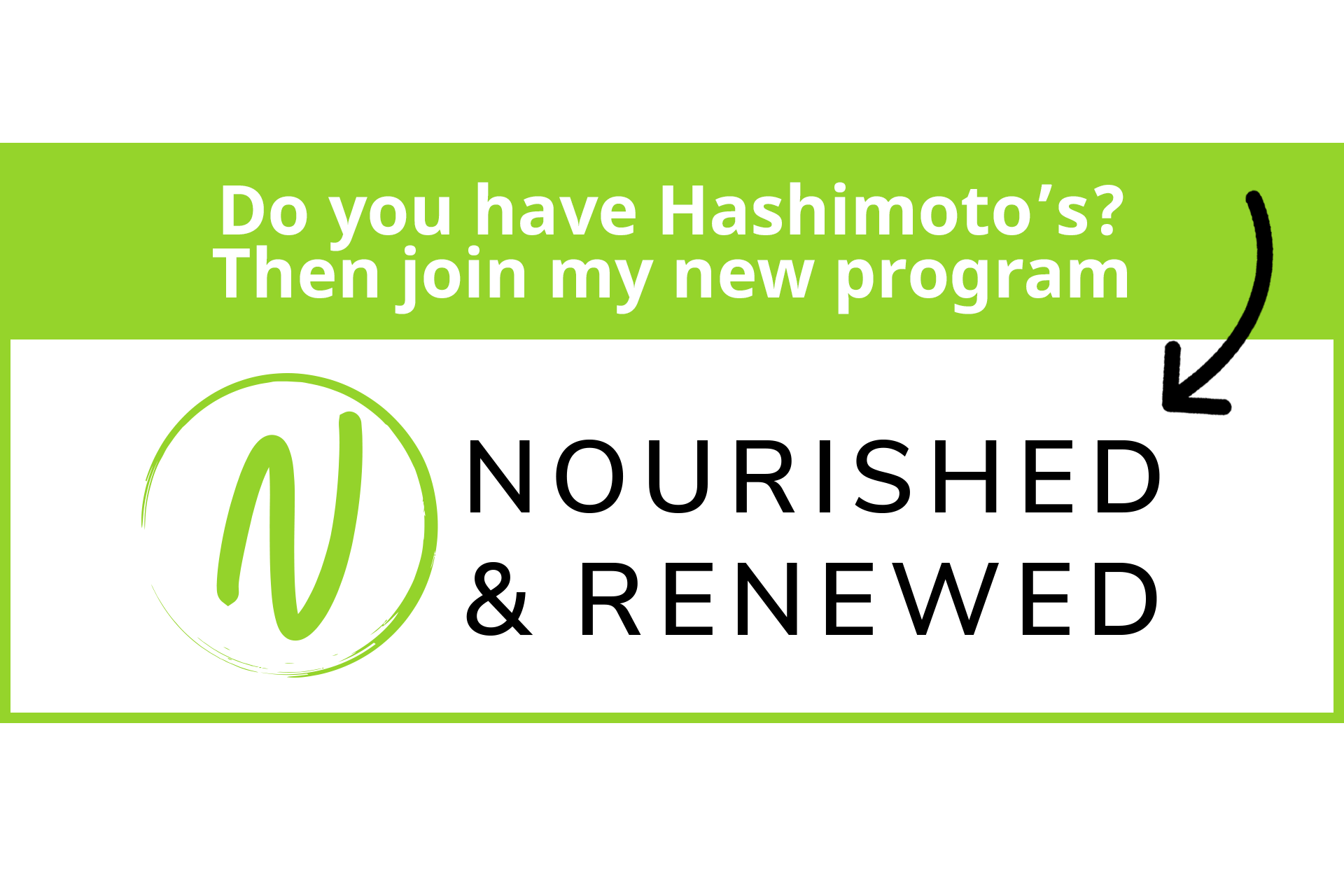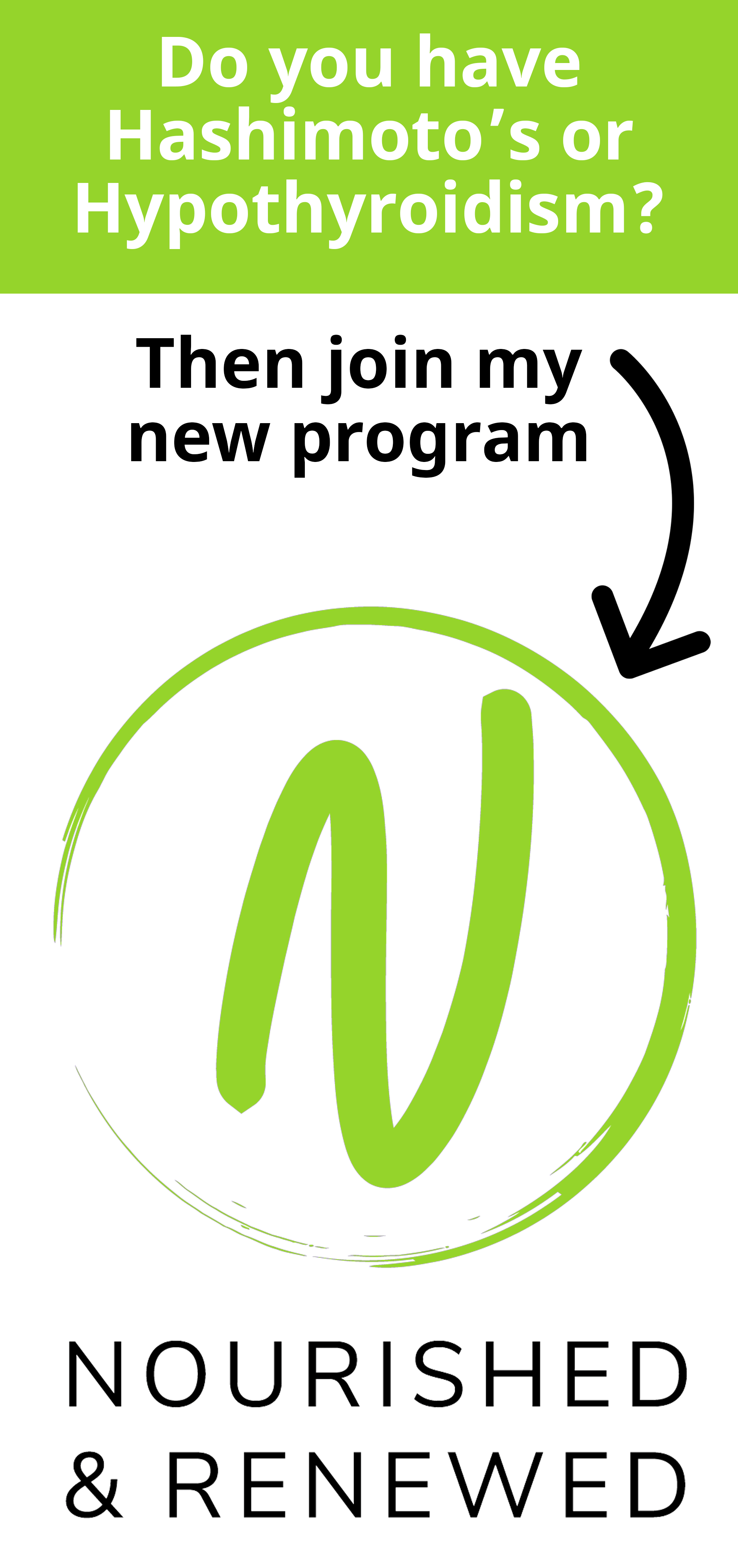If you have Hashimoto’s, you probably have now (or have had at some point) a degree of Adrenal Fatigue. To recover and feel amazing again, having the right nutrition & lifestyle can fix that!
Hear my story.
Hashimoto’s + Type A = Trouble
I consider myself to be a “Type A” person.
You know, work hard, play hard.
Type As get. Shit. Done.
But, if you don’t know this yet, well, um, SPOILER ALERT: there are consequences to being Type A.
Especially if you have Hashimoto’s disease.
But you know what else? Most people I know with thyroid problems tend to be Type A People.
Probably not a coincidence.
In fact, in my opinion, there is a pretty big correlation between the work hard/play hard type and the type of person who will end up having thyroid dysfunction or autoimmune thyroid.
Yep, I see the stereotypical Hashimoto’s “type” person walk through my office doors all the time:
Walking fast, talking fast, often a Starbucks in hand, late from somewhere great, ready for the next big thing, can handle just about anything, even if overwhelmed, doesn’t ever seem tired...hmmm….
Me most of my life = hurry, do more, push through, smile.
My old daily routine might have gone a little something like this:
- Wake up at 5 am
- Coffee (lots of coffee)
- Work until the family wakes up (emails, writing, scheduling, research, etc.)
- Get the kids out the door to school
- Walk the dog 45 mins or go to morning hot yoga for 60 minutes
- Work (clients etc., for a few hours)
- Costco mega-shopping trip over lunch + more coffee
- Go to kids’ school to volunteer
- Carpool to kids’ sports and activities
- Dinner and homework time
- Clean up dinner, make tomorrow’s 5 am coffee (coffee timers are the devil’s-work)
- Answer a few more emails, check social media
- Lights out by 11ish
- Start over
I only wish that list was an exaggeration of the old me, but it’s true.
“I’ll rest when I am dead.”
That was secretly my old motto. (Not anymore, no ma’am!)
I mean, who was I to make time for self-care when there was so much to be done in such a short day?
Ladies, I am talking to you.
Yep.
Please stop for a moment and think about how vital you are to SO many other lives.
You have got to fill your own cup up first, Mamma.
I didn’t get that concept for a really long time. Like 40+ years long.
I operated like a Type A damn fool on hyper-drive for 40+ years!
Day in and day out.
And, all the while, girlfriend, I was dealing with my Hashimoto’s, Celiac disease and a brewing concurrent health situation (because of my insane lifestyle + Type A personality) which ultimately could not be ignored….Adrenal Fatigue Syndrome (AFS).
Adrenal Dysfunction is a Modern Disease
My old modus operandi was literally insane. (And, if I am not careful, I can slide right back in to old, unhealthy patterns in a wink.)
I’d like you to stop and think about what our adrenal hormones are supposed to do for us in terms of our anthropological survival:
Short bursts of intense stress hormones (like running from a saber tooth tiger) would actually be quite helpful in keeping us alive.
Today, we are chronically running from every proverbial saber tooth tiger. Those tigers are ev.er.y.where.
Tigers are the triggers for turning us into Type A people whether we want to be or not.
And, as a consequence our adrenal hormones are TURNED ON.
Like a constant and steady stream of adrenaline and cortisol pumping to keep us alert, focused, on-task and successful, our adrenals do not take breaks.

Because we never take breaks.
As a society, we have pushed and pushed ourselves so that our adrenal glands must be fully operational at all costs.
Cortisol and adrenaline 24/7 is dysfunctional at best, and debilitating if not caught soon enough.
According to Adrenal Fatigue expert, Dr. Lam, (with whom I have personally consulted, more on that later) stressors that can lead to Adrenal Fatigue include:
- Anger
- Chronic fatigue
- Depression
- Chronic illness including autoimmune diseases
- Excessive exercise
- Chronic infection
- Fear and guilt
- Chronic pain
- Gluten intolerance
- Low blood sugar
- Malabsorption
- Mal-digestion
- Toxic exposure
- Severe or chronic stress
- Surgery
- Late hours/graveyard shift work
- Sleep deprivation
- Excessive sugar in diet
- Excessive caffeine intake from coffee and tea
- Chronic infected root canal or other serious dental problems
That is a list of pretty much everything in life.
I for one, had at least 6 of those stressors going for me for a long time.
As humans, we have so much exposure to stuff that is not great for us. Downright bad for us.
And, as you can see, Adrenal Fatigue has a pretty extreme psychological component.
How did this crazy life become the norm?
Isn’t it so darn easy to get caught up in this rat race? Keeping up with the so-and-sos? To do more, be more, be better, look better, be more successful, more productive?
To appear like a Type A person, even if we feel Type Z and just need a break?
It’s pretty much socially acceptable to be a crazy woman.
Moms, you know this. Other moms validate this for us.
Mom-life is a non-stop merry-go-round of illustrating to each other how damn busy we are.
And, joking about it.
Until it’s not funny.
And, that is when – in addition to any other triggers for autoimmune disease – stress becomes the straw to break the camel’s back.
Most women I see in my practice are just like me.
Work and do-everything-aholics until the body says HELL NO.
And, what does that look like?
Common symptoms of early Adrenal Fatigue Syndrome
(AKA: “Wired & Tired”)
- Feel exhausted often (Type A's and athletes typically push through this)
- Feel overwhelmed, constantly stressed out
- Crave sweets, salty foods, and caffeine or nicotine
- Crash around 3 or 4 p.m.
- Feel more awake and energetic in the evening
- Poor sleep patterns, insomnia
- Difficulty waking in the morning
- Slow to recover from illness, injuries, wounds, or exercise
- Frequently sick, longer duration of illness
- Assailed by allergies, and environmental sensitivities
- Hormonal imbalances
- Lightheaded when rising from a seated or reclining position
- Shaky, lightheaded, and/or irritable when going too long without food
The Adrenal and Thyroid Connection
“Imagine the adrenals as the engine of your car, and the thyroid as the accelerator pedal.
If the engine is broken, you can press the accelerator all you want but you aren’t going anywhere.
Likewise, if the accelerator is broken, the best engine in the world can’t respond. This creates a see-saw relationship between the thyroid and the adrenals.
If one side is too high, it pushes the other side lower. If one side is too low, the other will raise up to compensate.”
But, just like with a car, burn-out can and will happen if the delicate balance between the two glands is not carefully maintained.
Oh, don’t worry, burn-out does not usually happen over-night.
Adrenal fatigue usually takes place over a period of phases.
Stage 1: Alarm
During this stage the body goes on high alert and increases anti-stress hormones, such as cortisol and dehydroepiandrosterone (DHEA).
Mainly, the adrenal glands are able to handle the stress being placed on the body.
Hormone production may be slightly affected, but for the most part the body is able to produce enough cortisol and DHEA to compensate.
Fatigue is usually mild and typically occurs in the morning or in mid-afternoon. Normal daily function is expected, although peak performance isn’t achievable.
To counteract this early stage of adrenal fatigue, people turn to coffee, caffeinated sodas, energy shots, chocolate, or sugary, high-carbohydrate foods.
These compensatory actions are generally socially acceptable and may even be considered a “normal” part of modern living.
In other words, a lot of people are in this stage.
Stage 2: Resistance
When the body is under constant or severe stress, cortisol levels continue to rise and then DHEA levels start to gradually decrease.
Although normal daily activities can still be carried out, fatigue is more pronounced by the end of each day and the body requires more rest than usual to recover.
As the stress-response system becomes overwhelmed, the adrenals begin to struggle.
Symptoms such as body aches, depression, digestive problems, disrupted sleep patterns, elevated blood pressure, heart palpitations, hyperventilation, irritability, jitteriness, loss of appetite, menstrual irregularities, nervousness, weight gain, and a sensation of feeling cold arise.
Infections become recurrent.
More stimulants may be used to enhance energy and elevate mood.
The thyroid gland is usually affected at this stage. Hashimoto’s may develop or worsen.
Stage 3: Exhaustion
If the stress isn’t reduced, adrenal function will be further weakened because the body’s need for cortisol (to combat the stress) remains unabated. And the adrenals can’t keep up with the demand.
When a person reaches this stage, anxiety and exhaustion begin to appear simultaneously.
Cortisol output gradually declines, and the body tries to conserve energy to ensure survival.
This catabolic phase results in the breakdown of muscle tissue to produce energy.
Chronic fatigue is common, exercise tolerance is reduced, and fibromyalgia may appear.
As normal detox processes slow down, toxic metabolites begin to accumulate throughout the body.
Toxicity symptoms like headaches, brain fog, insomnia and depression kick in.
With a loss of homeostasis, the body enters into a state of disequilibrium.
Without sufficient levels of hormones, the body begins to shut down nonessential functions to conserve energy in order to survive.
A woman’s menstrual cycle may cease or become unpredictable. Fertility is affected and pregnancy becomes difficult to achieve.
Digestion slows and symptoms of irritable bowel syndrome (IBS), malabsorption, bloating, nausea, and more become daily concerns.
The afflicted individual may be unable to get out of bed or will have energy that lasts only briefly.
Blood sugar levels plummet, and this leads to a further intolerance to stress as well as to increasing mental, physical, and emotional exhaustion.
This stage is sometimes referred to as an “adrenal crash” or “adrenal burnout.”
When the symptoms of this stage interfere with day-to-day activities, the individual typically seeks medical treatment.
I’ve been in this stage (3) and it’s not pretty. Bit more on this in the next section.
Stage 4: Failure
Although it rarely occurs, this final stage constitutes a failure of the adrenal glands in response to stress.
When people at this stage are confronted with a stressful situation, they are now susceptible to cardiovascular collapse and even death.
When adrenal fatigue has advanced to this point, the line between adrenal dysfunction and adrenal insufficiency (Addison’s disease) is muddled.
Symptoms may include sudden penetrating pain in the abdomen, legs, or lower back; severe diarrhea and vomiting; dehydration; low blood pressure; and loss of consciousness.
How Adrenal Fatigue Syndrome may lead to Hashimoto’s
It was clear in my 20s that I was developing some thyroid dysfunction because I had all the typical Hashimoto’s symptoms.
What I didn’t know then, but I definitely do know now, is that prior to my Hashimoto’s diagnosis, I also flirted frequently with Adrenal Fatigue.
Like I said, I am a Type A person.
Out of college, I also had one hell of a stressful corporate job that I hated. And, I brought on a lot of stress for myself with relationships, finances and I ate like crap.
Which came first - it is a chicken or egg scenario! It’s pretty much impossible to know this, because there are so many possible triggers for Hashimoto’s.
A combination of factors determined my likelihood of developing Hashimoto’s:
- Genetic influences, especially compound heterozygous MTHFR mutations
- Environmental exposures, including food antigens - mainly gluten (I found out I was Celiac after my Hashimoto’s diagnosis)
- Toxicity from food and environmental sources
- Deficiencies in total body nutrients that resulted from improper diet, toxic overload, and impending autoimmune disease
- Other hormone imbalances, such as reproductive hormones (estrogen/progesterone/testosterone) because I had been on the birth control pill for more than 10 years
- Potential pathogenic activity from a lifetime of strep infections, mono (Epstein Barr virus) and resultant antibiotic over-prescription since childhood
- Lack of digestive integrity and increased permeability of my gut wall
- Stress on the adrenal glands due to diet and lifestyle stressors
This is true: Type A people will ultimately burn out, and experience some degree of Adrenal Fatigue.
And, when your adrenals are constantly stressed, this can set off an autoimmune, inflammatory response in your entire body, eventually prompting an autoimmune crisis.
It’s a vicious cycle.
So, Hashimoto’s may make you more susceptible to that burn out. Or burning the candle at both ends for too long might have been a trigger for your Hashimoto’s.
So, stress and adrenal dysfunction can trigger Hashimoto’s, OK?
Hashimoto’s Can Trigger Recurrent Adrenal Fatigue Syndrome
So, was it being Type A + stress + my Hashimoto’s triggers all lined up which lead to Hashimoto’s?
Or, was is having undiagnosed Hashimoto’s as one of my triggers for Adrenal Fatigue Syndrome?
I will never know. But, they are cousins of the same dysfunctional family.
I am certain AFS was part of the picture of my poor health at the time of my Hashimoto’s diagnosis in my early 20s, even though it was not discussed with me at the time.
I have since had a pattern of concurrent thyroid and adrenal ups and downs in the 20 or so years that have followed.
My most challenging period of AFS was last year
The most severe case was last year, when an unknown adult congenital heart condition disrupted my healthy balance.
The toll my heart condition took on my body had a direct negative impact on both my thyroid and adrenals.
It was a BIG new stressor, to say the least.
My thyroid levels changed for the worse for the first time in years.
My thyroid replacement medication dosage changed for the first time in years.
Many of my Hashimoto’s symptoms returned.
And, with all this, Adrenal Fatigue hit hard and fast.
I was actually caught off guard with the symptoms of stage 3 AFS, because they were pretty severe.
The reality is: I am probably always heading towards AFS because of my Hashimoto’s. It doesn't take much to go all the way.
What to do if You Think Both Hashimoto's and Adrenal Fatigue are Affecting You
If you have Hashimoto’s, you probably have now (or have had at some point in your adult life) some degree of Adrenal Fatigue.
Initially, it’s hard to know if your symptoms are thyroid or adrenal-related, but quite often, neither is functioning at their optimal level when symptoms arise.
People with Hashimoto’s are no stranger to experiencing depression, dry skin, forgetfulness and other similar symptoms when they suffer from hypothyroidism.
If that is you, you may not realize that those symptoms can also be attributed to poor adrenal function.
This makes it quite difficult for healthcare professionals to accurately diagnose your condition.
It would be wonderful to have a functional medicine doctor look at the functionality of both gland types in order to determine which is causing these symptoms.
Furthermore, it is also vital to know that when the adrenal glands fail to produce an adequate amount of cortisol, and a patient is suffering from Hashimoto’s as well, then their symptoms may become even worse.
I sought the advice of numerous practitioners to help me heal my adrenals last year.
I consulted with adrenal expert, Dr. Lam, who helped me interpret my own saliva cortisol tests (it’s really hard to work on yourself when you are that sick) and gave me suggestions for getting better.

Testing For Adrenal Fatigue
Individuals suffering from the symptoms that are often associated with both Adrenal fatigue and Hashimoto’s should not be tested for a malfunction in a single gland.
But they should rather obtain accurate tests to determine how well both their Adrenal glands and their Thyroid gland are functioning.
Different tests should be considered. The right combination of tests will provide your healthcare provider with details regarding what exactly is causing the problems.
And it will lead to a more appropriate treatment as compared to only testing the functionality of either the Thyroid gland or the Adrenal glands alone.
My suggested tests for this scenario include:
Thyroid stimulating hormone (TSH)
Checking the levels of TSH is often the first (and sometimes only) test that doctors will use to see how the thyroid gland is working.
When the thyroid is not working correctly, the pituitary produces TSH to stimulate the thyroid into producing thyroid hormones.
A high TSH level can indicate an underactive thyroid.
T3 and T4
These are the two main hormones that the thyroid gland produces.
Levels do not change significantly with an underactive thyroid, but some doctors carry out the test to rule out other thyroid conditions.
Testing for the Free T3 and Free T4 can be helpful in understanding how much of the active hormone is available for use in the body.
Thyroid antibody testing
The thyroid gland contains cell proteins, and sometimes the body produces antibodies against these proteins.
If this happens, it can cause both underactive and overactive thyroid disease.
Saliva hormone + 4 point cortisol test
Saliva testing is an easy and noninvasive way of assessing your hormone balancing needs, and is proving to be the most reliable medium for measuring hormone levels.
In addition to measuring sex hormones, saliva hormone testing can also give accurate information about your cortisol levels, when drawn at 4 points during the day.
This gives clues about where the diurnal cortisol curve is out of balance and how nutrition and lifestyle can help.
If cortisol is out of balance, then you can bet sex hormones are out of balance as well.
Remember, there is constant interplay between sex hormones, adrenal hormones, thyroid hormones – and many others!
I suggest the following saliva hormone test for the clients I work with remotely: Salivary Hormone Panel by Diagnostechs. It costs $379 but is valued at over $600.
What’s Being Tested:
Cortisol (4 samples – 24 hours)
DHEA
Testosterone
Estradiol
Estrone
Progesterone
Androstendione
DHT
LH
FSH
SIgA
The good folks at True Health Labs allow you to directly order labs that make the most sense for your health condition, allowing you to better participate in the overall management of your health.
If you do order these labs, be sure to take them with you to your next provider appointment.
Show them that you are willing to do what it takes to get the correct information for the best treatment plan possible.
Working with me through the customized Adult Advanced Program is the best way to utilize saliva hormone test results for optimal dietary and lifestyle enhancements.
I interpret the results of your saliva hormone testing and explain your total sex hormone, adrenal and thyroid health picture.
Once we know what is out of balance, we know best how nutrition and lifestyle can help.
How Nutrition Can Help
Nutrition can really make a huge impact on your adrenal health. I know this from first-hand experience.
My clients asking for the “magic pill” to help them combat their adrenal fatigue are met with my recommendation for food and lifestyle remedies.
There really is no secret to this.
Taking care of yourself is the only answer.
Try these top 5 nutrition tips to start healing your adrenals:
- Sprinkle sea salt liberally to food. to help support adequate production of adrenaline, cortisol and aldosterone in the adrenals. Lack of aldosterone can disrupt the sodium balance at a cellular level. (NOTE: Those with heart disease, hypertension or kidney disease should consult with a professional first as salt may be contraindicated.)
- Balance carbohydrates, fats, and proteins at every meal in order to help support healthy blood sugar levels and prevent hypoglycemia when your adrenals are not functioning properly.
- Reduce caffeine because it over-stimulates the thyroid and taxes the adrenals.
- Remove alcohol, sugar and refined carbohydrates because alcohol and sugar both cause inflammation and feeds overgrowth of the wrong/bad bacteria in our gut.
- Stay on a schedule with meals, and eat frequently.
A healthy breakfast example:
1 organic navel orange; 4 ounces of broiled organic turkey sausage; two poached pasture-raised eggs; herbal tea to drink
A healthy lunch example:
2-3 cups of fresh salad greens and 4 ounces of diced organic chicken breast with loads of brightly-colored veggies with sea salt and pepper to taste, olive oil and fresh lemon juice; kombucha or water to drink
Healthy snack examples (2-3 per day, including before bed):
1 wedge of soft-ripened sheep’s milk cheese and 10 flaxseed crackers OR 1 sliced organic apple with 2 TBS organic almond butter
A healthy dinner example:
1 baked sweet potato with 1 TBS coconut oil and sea salt; 5 ounces of wild-caught grilled salmon; 1 cup of steamed broccoli
Lifestyle Tips for Healthy Adrenal Glands
This might be the most important thing of all - self care in action!
The best way to support tired adrenals is to REST.
Read on for more...
- Go to sleep by 10 p.m. (ALWAYS!)
- Have a self-care bedtime ritual that includes baths, stretching, shutting off screens, applying essential oils, etc.
- Sleep in as long as possible in the morning
- Take naps when you need to
- Avoid getting over-tired
- Do the things that you like
- Say “no” to whatever is not serving your best health
- Laugh several times a day - seek humor and happiness in daily life
- Do deep belly breathing exercises frequently through the day
- Meditation is beneficial for calming the “monkey mind” if you find yourself feeling overwhelmed or anxious
- Seek a qualified talk therapist to help you work out stresses and solve problems
- Surround yourself with kind, happy, helpful people
- Don’t be afraid to ask for help!
- Love yourself unconditionally, be gentle and repeat positive affirmations to yourself if you are feeling stuck - things will change.
Lifestyle is Key to Recovery For Adrenal Fatigue Syndrome
My most recent struggle with AFS wasn’t too long ago.
Today, I am doing things quite differently in order to prevent further thyroid or adrenal dysfunction.
My Type A personality has been put in a box up on the shelf.
I make loads of time for self care. I am walking the talk.
And, yes, it’s a balancing act. Like, I said, I have to be careful or I can slip back into old habits.
This is the thing I tell my clients who have the same issues:
“Be gentle with yourself, rest. You know your body best, so if you need to slow down in order to take good care of your health, then that is what you need to do.”
Self-care really is the best medicine.
Looking for a Guided Approach to Balancing Hashimoto’s and AFS?
I know from my own experience that when you are down with adrenal fatigue, doing even the simplest things to help your body heal can feel overwhelming.
Sometimes you need a helping hand.
If you want to learn about how Hashimoto's and adrenal fatigue is affecting your total health and how to restore your body's natural balance, I have a 30-day online program "Nourished and Renewed with Hashimoto's" that can assist your healing journey.
You can also check out my Happy & Healthy Adult Program – designed for individuals with Hashimoto’s (and also AFS) looking for a personalized, sustainable and joyful approach to nutrition and lifestyle measures which can help heal your body.
I am here to help!














